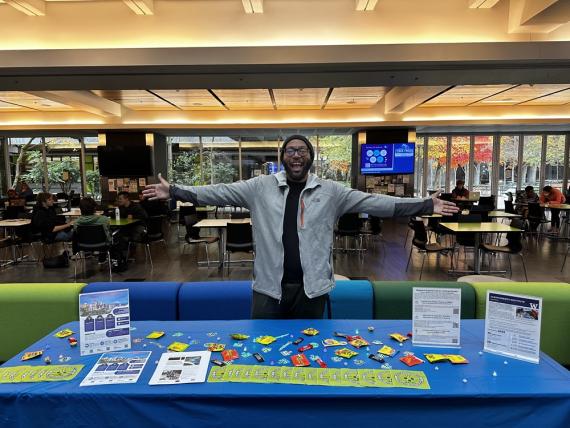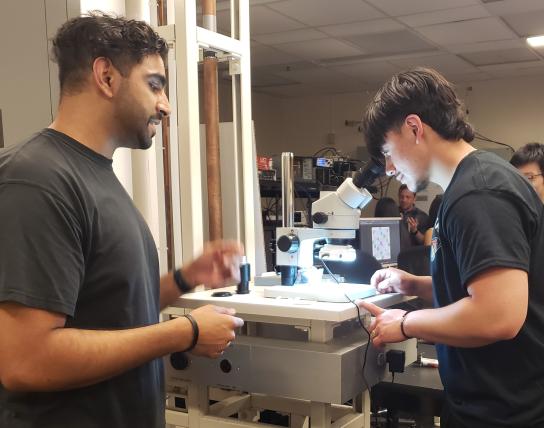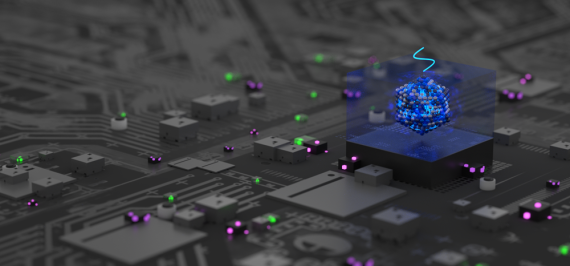Optoelectronics is one of the foundational technologies of the information age: it spans displays, data transmission, sensors, and future quantum information systems. Researchers across multiple disciplines at eleven universities are employing state-of-the-art theoretical and experimental tools that enable the synthesis of transformative technologies and materials that fundamentally change how we interact with light. And the University of Washington is the hub of this interdisciplinary team.
Professor David Ginger, the B. Seymour Rabinovitch Endowed Chair in Chemistry, is the director of the Center for Integration of Modern Optoelectronic Materials on Demand (IMOD), a National Science Foundation Science and Technology Center headquartered at the UW. IMOD aims to enable quantum dot (QD) and quantum well (QW) structures into new materials and devices. By developing atomically precise semiconductor materials and scalable manufacturing processes, Ginger and his collaborators are working to unleash future generations of electronics and optoelectronics technologies designed and manufactured in the USA.
IMOD faculty support this mission. At the UW, they include Professors of Chemistry Brandi Cossairt, Daniel Gamelin, and David Ginger, Professor of Physics Kai-Mei Fu, and College of Engineering faculty Professors J. Devin MacKenzie (Materials Science and Engineering) and Arka Majumdar (Electrical and Computer Engineering). Together, they support the training and development of a diverse body of undergraduate students, graduate students, and postdoctoral researchers to become an agile and well-rounded generation of scientists and engineers.
Along with these dedicated researchers, the UW IMOD team includes Christopher Arnette, Ph.D., director of supporting and broadening participation; Lisa Neshyba, M.Ed., director of education and human resource development; Brenda Li, operations manager; and education fellows. With IMOD colleagues across the country, they create educational and outreach opportunities that make a lasting impact.
Building Relationships, Bridging Communities
IMOD’s training and development mission goes beyond scientific training in the lab. Arnette and Neshyba enhance the faculty-led training with specialized programs that cultivate empathy in scientists and promote DEI principles, personally and professionally. Arnette has led multiple integrative activities initiatives, such as industry days/knowledge transfer lectures, the dual mentorship program, and the IMOD Research Experience for Undergraduates (REU).
Arnette’s dedication to meeting people where they are guides IMOD’s engagement with students and postdocs, industry partners, and the public. IMOD’s recent efforts in seeking to understand the needs of its own community and nearby communities have produced deeper engagement with partners. This includes professional and technical development and access to real-world experiences that will allow early career researchers to better position themselves for a competitive job market. Arnette is creating a legacy of mutually beneficial relationships that will outlast the lifetime of the Center.

Arnette also leads IMOD’s participation at national meetings of professional societies. These efforts forge new connections with students, postdocs, and faculty from minority serving institutions (MSIs). The impact of IMOD’s presence at the National Organization for the Professional Advancement of Black Chemists and Chemical Engineers (NOBCChE) Conference, the Society for the Advancement of Chicanos/Hispanics and Native Americans in Science (SACNAS) National Diversity in STEM Conference, and at the Annual Biomedical Conference for Minoritized Scientists (ABRCMS) is being realized. This is seen in the form of REU applications from conference participants and on-going discussions with potential research seminar speakers from MSIs.
Fostering Transformational Opportunities
When Arturo Lopez met Neshyba at the Young Executives of Color (YEOC) conference hosted by the Foster School of Business, he “was hooked by her enthusiasm and passion for her work.”
Lopez and his classmate Jessika Santiago are both starting their second year at the UW. They participated in the YEOC program while serving as board members for L.U.C.H.A. (Latinos Unidos con Honor y Amistad), a service-oriented club at Mt. Vernon High School. That single day on campus with YEOC began a years-long relationship and collaboration with IMOD. Santiago is now an IMOD education fellow who spearheads the development of a national network among underrepresented minority (URM) affinity groups in K-12 STEM. Meanwhile, Lopez works in IMOD’s Quantum Technologies Training and Testbed Lab (QT3) with Research Assistant Professor Max Parsons, QT3 Lab director.

While college was always in Lopez’s plan, his passion for engineering only budded as a senior in high school and his first year of college. “IMOD gave me the platform to access the lab space where I currently work,” says Lopez. “I have been exposed to physics that I would not have otherwise learned about until much further into my major. I have been given the opportunity to apply material in a way that would not have been possible through my regular coursework.”
Lopez recognizes that imposter syndrome and lack of self-confidence, especially in students whose backgrounds are like his, “prevent them from shining.” Lopez adds, “If I were to advise younger students, I would tell them to not be afraid to go for the opportunities that excite them.”
Extending the Reach of Outreach
IMOD’s commitment to outreach is further exemplified by its Quantum LEAP Ambassadors program, which has reached more than 1,100 students through classroom visits and field trips, prioritizing marginalized communities of young learners. Achieving this reach with limited resources and competing schedules is no small feat. To maximize their impact, IMOD formed a coalition with the Clean Energy Institute, numerous UW STEM labs, and the grassroots initiative STEM Pals to provide unique and exciting STEM learning experiences to K-12 students.
Through interdisciplinary team collaboration, the effective sharing of knowledge, and the value and importance of an inclusive and diverse workforce, IMOD is not only advancing research but also nurturing the next generation of scientists and engineers, ensuring that opportunities for growth and discovery are accessible to all.
